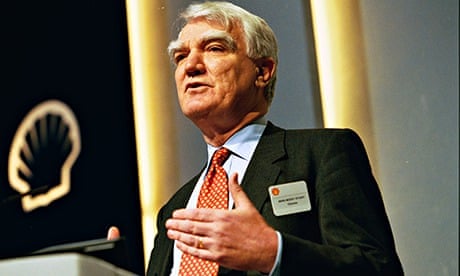For Elizabeth II, it was 1992. For Juan Carlos I, 2007. In the case of Sir Mark Moody-Stuart, former chair of oil giant Shell, his annus horribilis came in 1995.
Crisis number one arrived in the shape of Brent Spar, a decommissioned oil rig that Shell wanted to dump in the North Sea. Greenpeace thought it unwise; press and public agreed. Second came the Nigerian military junta's execution of Ken Saro-Wiwa, a popular writer, campaigner and vocal critic of Shell. Many felt the Anglo-Dutch oil giant should have done more to intervene.
Nearly 20 years on, Moody-Stuart has taken to the page to describe the results of that "very bad year". But don't expect a tell-it-all confession. Responsible Leadership is a sober book written by a sober executive. But it makes for intriguing reading all the same – mostly because its author has been instrumental in framing how corporate responsibility is understood.
If one word defines Moody-Stuart's business philosophy, it's "engagement". It might not sound radical, but look back two decades and chief executives would have laughed at the prospect of actually talking to outsiders about business decisions. Brent Spar and Nigeria debunked that mindset: the world was changing and yet companies like Shell, locked away in their gilded boardrooms, weren't aware.
"There's no good standing on your side of the fence and telling everyone what you think about it," says Moody-Stuart. "You really have to sit down and try and understand what it is that bothers other people."
Political engagement also falls within his definition of the term. When Moody-Stuart joined Shell as a field geologist in the late 1960s, the employer had two basic rules relating to government: don't pay bribes and don't get involved in local politics. In practice, this meant Shell paid its dues in taxes and then washed its hands of whatever followed.
It took events in Nigeria – where Shell was (and still is) paying the government billions of pounds – to realise that a more pro-active position was needed. "People turn round and say, what impact did it [oil revenue] have," says Moody-Stuart. "We say, well, we wanted more money to go to the communities. And they say it didn't happen, did it?"
His second favourite theme is partnerships. He's a strong proponent of cross-sector initiatives – anything that gets businesses working together and preferably with others as well. A whole chapter of the book is dedicated to the United Nations' Global Compact, for which he declares himself a "great enthusiast" and whose foundation he chairs. His other key message is the importance of business principle. After the Saro-Wiwa affair, Shell introduced a clause on protecting human rights into its ethics charter. At around the same time, it made formal commitments on sustainable development too.
It's all very British. A company, like a respectable gentleman, should say what it stands for and then stick to its word. But principles are easy to write and "walking the talk", to quote a phrase popularised under Moody-Stuart's chairmanship in the late 1990s, is a different beast. "It has to cost you money," he suggests. Lose a contract after not paying a bribe, for example, and your employees will know the anti-corruption principle has teeth. Reporting against stated principles provides further proof of intent.
Moody-Stuart's recipe for responsible business will satisfy some, but not all. When, and where, should a company draw the line? For him, it's much preferable to "dine with the devil" than pull out of a country and lose influence. (No surprise that's he's against sanctions). And on what topics should you engage? Tackling corruption saves companies money, but finding viable low-carbon energy sources to combat climate change is a difficult line to flog an oil company, as Shell's lacklustre embrace of renewables testifies.
Moody-Stuart, like most of his peers in big business, favours voluntary norms over binding targets. According to the argument, industry pressure gets laggards to catch up. That may be true but the voluntarist position presumes that corporate "frontrunners" are running fast enough and far enough already. As struggles in the UN over disclosure laws currently demonstrate, not all agree this is happening. Legislators are facing increasing pressure to set meaningful global laws for mega global corporations.
"One of the biggest risks faced by companies is that everyone starts thinking the same," Moody-Stuart concludes. His book marks a valiant attempt to avoid that trap. The conclusions won't re-write the rules of corporate capitalism – nor will they remove the risk of more anni horribiles in the future. But, if the book persuades his fellow corporate insiders to look outside their shells, then it should edge forward the debate.
'Responsible Leadership: Lessons from the front line of sustainability and ethics' by Mark Moody-Stuart is published on 5 March 2014 by Greenleaf
Join the community of sustainability professionals and experts. Become a GSB member to get more stories like this direct to your inbox

Comments (…)
Sign in or create your Guardian account to join the discussion